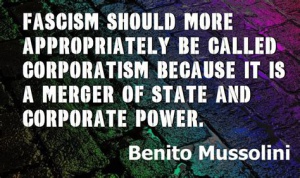Template:Corporatism

Corporatism
Corporatism is not the same as Capitalism because it involves a political system and Capitalism does not.
- corporatism: is a Political / Economic system in which power is exercised through large organizations (businesses, trade unions, their associated lobbying efforts, etc.) working in concert or conflict with each other; usually with the goal of influencing or subsuming the direction of the corporate state and generally only to benefit their own socioeconomic agendas at the expense of the will of the individual and the people in general, and to the detriment of the common good and the rights of the individual.
In the last half of the 1800's people in Europe who had accumulated vast areas of land held by some form of a corporation sole -- decided to protect their position and status through a process of syndication.
They formulate an alternative to socialism which would emphasize social justice without the radical solution of the abolition of private property. The result was called Corporatism, which was "the control of a state or organization by large interest groups". The basic idea of corporatism is that the society, its political system, and economy of a country should be organized into major interest groups (sometimes called corporations), and representatives of those interest groups settle any problems through negotiation and joint agreement. Variations of corporatism can lead to fascism.
The evil effects of corporatism can only flourish under the sloth of people in their pursuit of righteousness for all members of society.[1]
If the people fail to actively come together in defense of the individual rights and property of, for and by one another then corporations, which are organized by a contractual agreement, will develop undue power and excessive influence.
The secondary problem, although no less important, is the nature of the government created by the people.
There is often a corporate nature or identity created by societies with the establishment of a "State". There are limitations and duties, checks and balances you want to establish whenever you begin the process of the formation of a "State" through Covenants, Contracts, and Constitutions.
There are five of these limitations and the duty to read them every day to the government in Deuteronomy 17 less they and we forget.
The problems today with inequality of outcome which are not the result of nature, personal ability and application are not the fault of capitalism.
Those who think capitalism is the problem often do not understand that capitalism is not a political system nor does it prescribe moral limitation.
Those characteristics are the added effects of society and must be established by the individual property owners. This limited scope of capitalism puts the responsibility of the defects arising out of capitalism where they belong, with the people.
The People as the Masses
The People become divide when they dissolve the social bonds of a free society through the covetous practices of the world.
They degenerate into the Masses becoming subject to tyrants and their morals.
The command to love of one another and love thy neighbor as thy self along with the golden rule should compel all within society to come together in practical ways for the protection of all. Failing to do so or to do so in diligent service to righteousness will undoubtedly empower corporatism to fill the vacuum created by such sloth and avarice of the people.
- ↑ 1.0 1.1 "Freedom is the Right to Choose, the Right to create for oneself the alternatives of Choice. Without the possibility of Choice, and the exercise of Choice, a man is not a man but a member, an instrument, a thing.” Archibald MacLeish